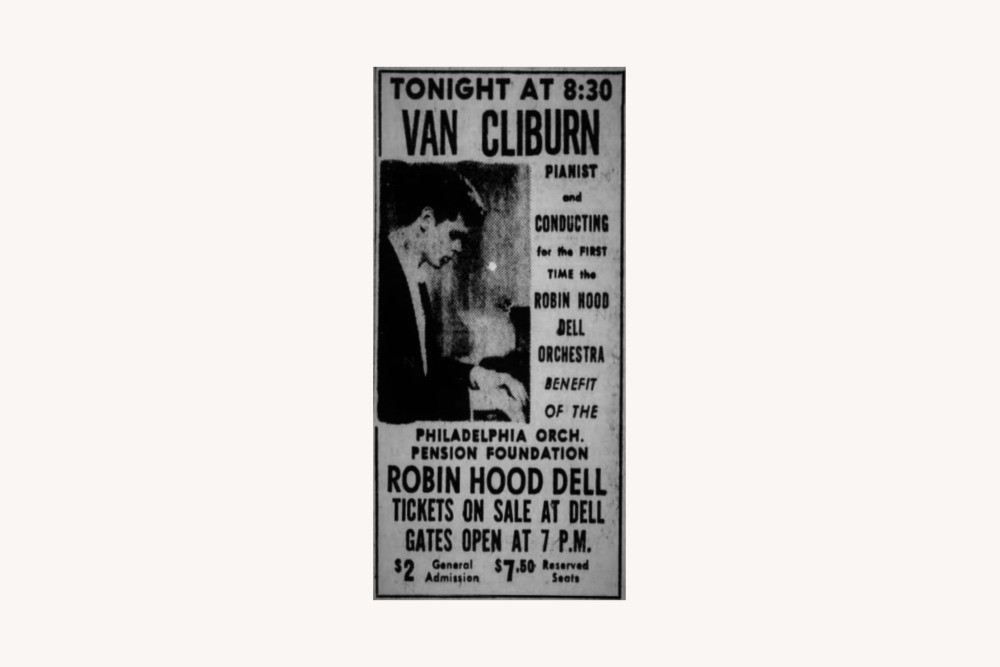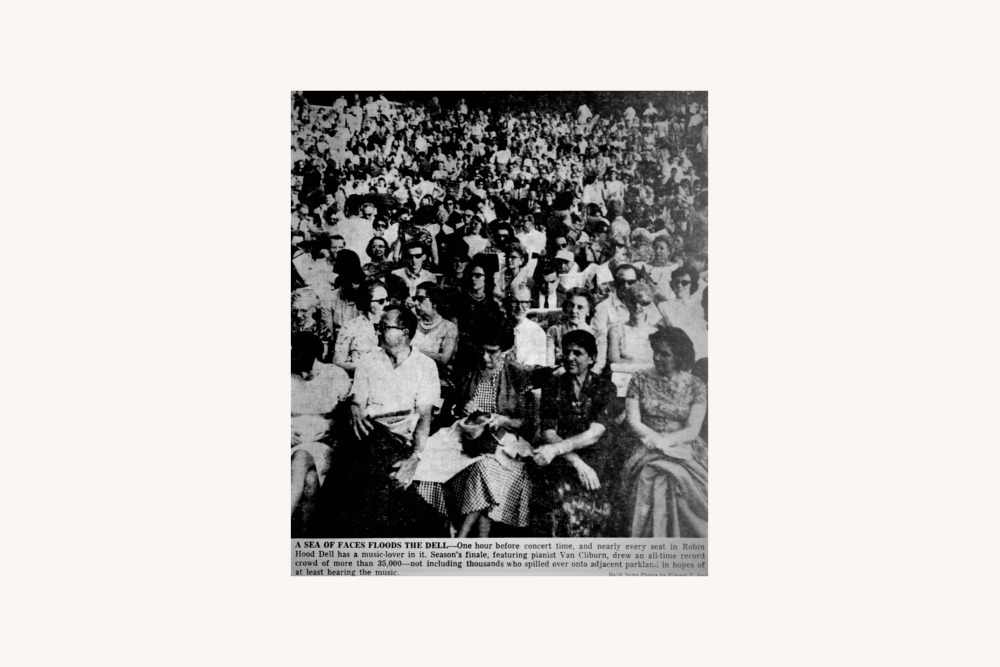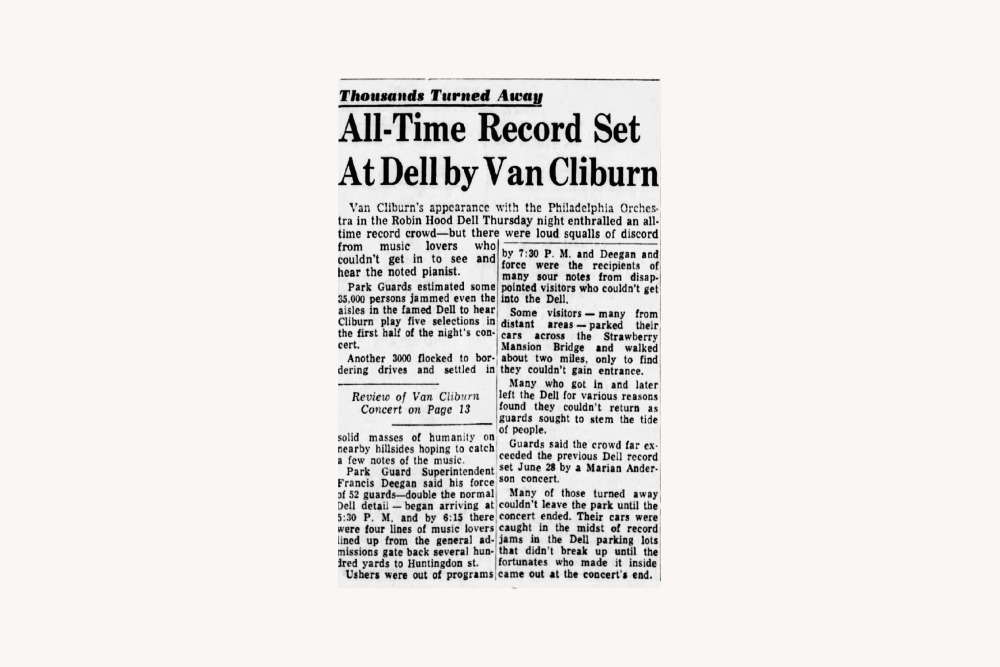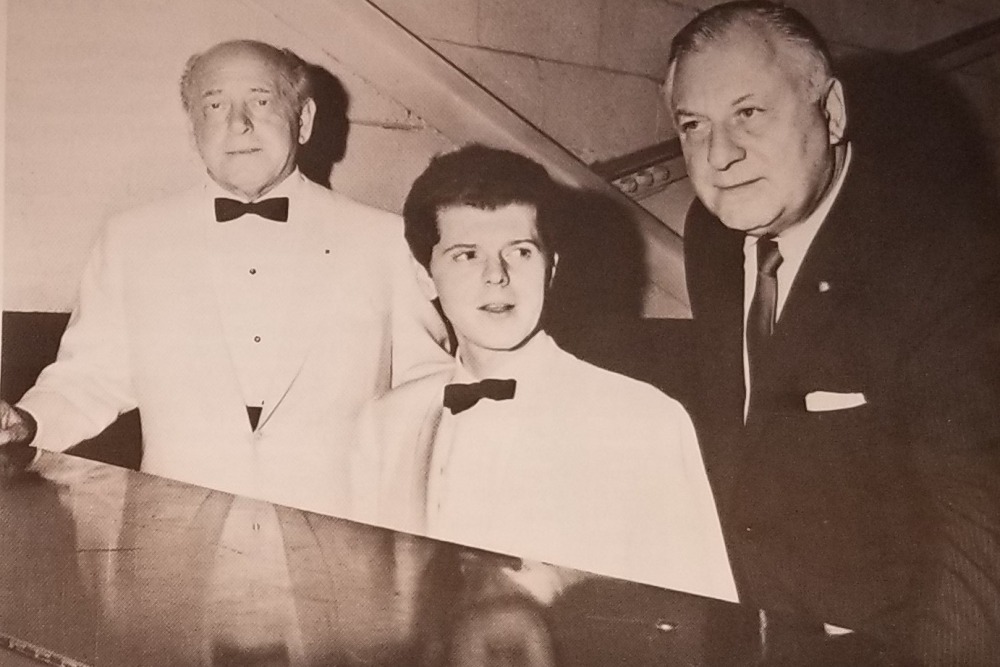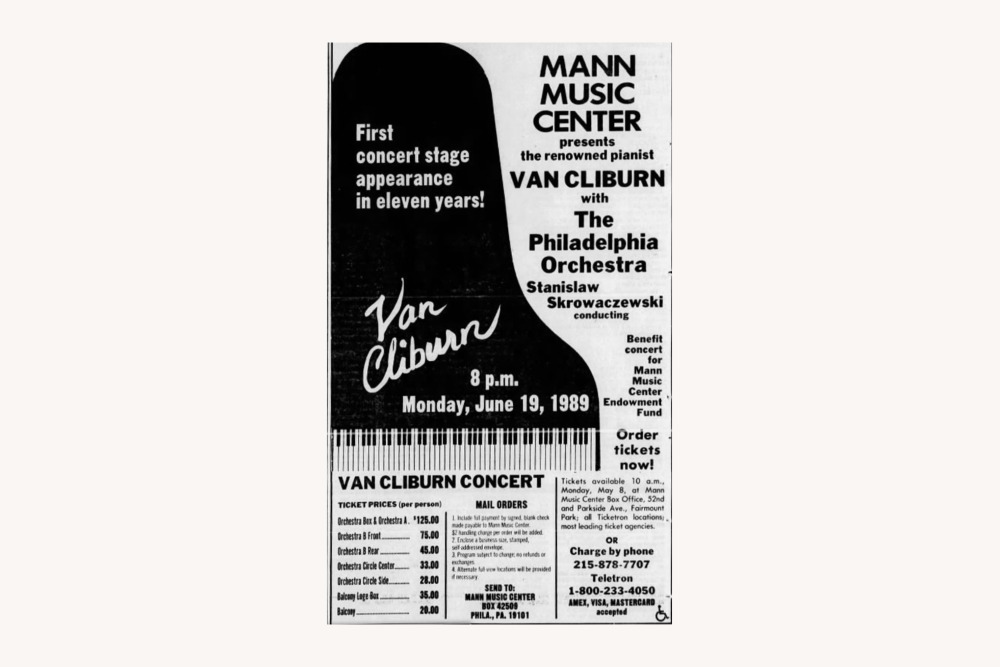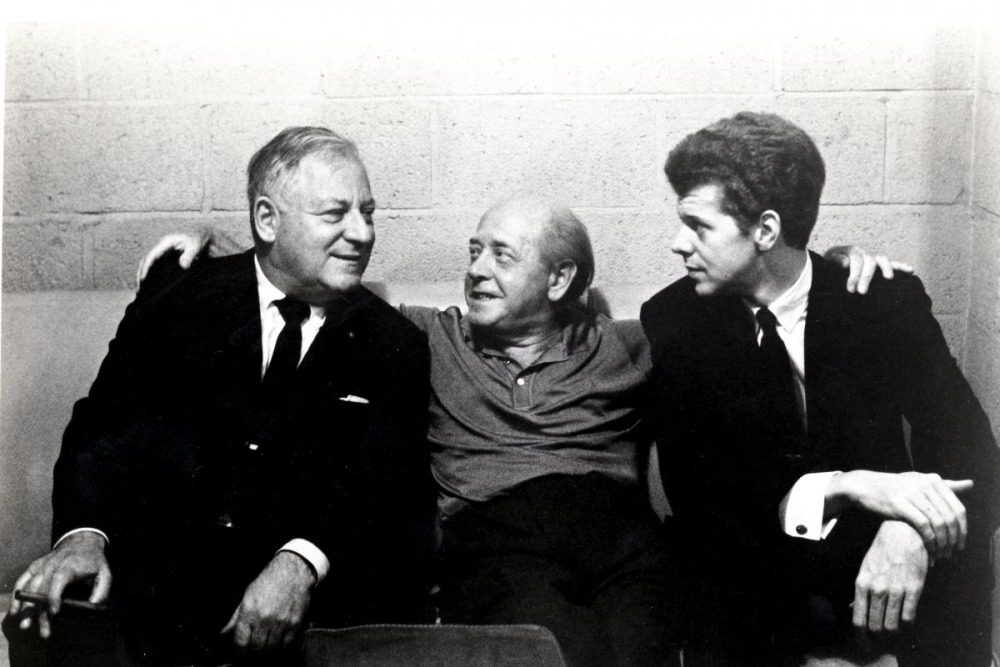From the Vault: Van Cliburn at the Robin Hood Dell & The Mann Center
MANN MUSIC ROOM: VAULT
Blog Entry by Jack McCarthy, Historian, The Mann Center for the Performing Arts
The Mann Center traces its history to the Robin Hood Dell, which opened in 1930 in East Fairmount Park as a summer home for The Philadelphia Orchestra. In 1976 the organization moved to a new venue in West Fairmount Park. Originally called Robin Hood Dell West, it was later renamed the Mann Music Center in honor of its longtime director and benefactor Frederic Mann, and subsequently renamed the Mann Center for the Performing Arts.
Born in Louisiana in 1934 and raised mostly in Texas, Harvey Lavan "Van" Cliburn Jr. was a child prodigy who rose to worldwide fame when he won the inaugural International Tchaikovsky Competition in Moscow in 1958. The broader geopolitical context of his victory brought Cliburn a level of renown few classical musicians have ever achieved. The Soviet Union and United States were in the midst of the Cold War in the late 1950s, superpowers vying for supremacy across the globe while building nuclear arsenals aimed at one another. When the Soviets launched Sputnik, the first artificial satellite to orbit the earth, in October 1957, Americans were shocked and fearful of this space age breakthrough by their archrival.
It was against this background that twenty-three-year-old Texas pianist Van Cliburn stunned the world by winning the Tchaikovsky Competition in April 1958 in Moscow, the heart of the Soviet Union. The competition was established that year partly as a way to highlight Russia’s great classical music tradition. Cliburn’s performance of two stalwart pieces of the Russian repertoire—Pyotr Ilyich Tchaikovsky's Piano Concerto No. 1 and Sergei Rachmaninoff's Piano Concerto No. 3—enthralled the audience and the judges. The judges were so concerned about awarding the gold medal to an American that they sought, and received, approval directly from Soviet leader Nikita Khrushchev for giving the top prize to Cliburn. The cultural and political impact of Cliburn’s achievement made him an immediate international star. He was given a ticker tape parade on Broadway in New York City, the only musician ever to receive that honor, and was featured on the cover of Time Magazine as “The Texan Who Conquered Russia.”
Van Cliburn embarked on an active touring schedule in the years following his Moscow triumph and was a frequent visitor to Philadelphia, performing both as a recital soloist and with Eugene Ormandy and The Philadelphia Orchestra, with whom he developed a close relationship. Cliburn’s debut at the Robin Hood Dell was on August 1, 1963, in the dual role of conductor and pianist. It was only the second time he had performed in such a dual capacity. The first time, two years earlier, also had Philadelphia connections. In 1961, Cliburn was scheduled to perform Sergei Prokofiev’s Piano Concerto No. 3, another Russian tour de force, in a memorial concert for the late conductor Dimitri Mitropoulos, with Leopold Stokowski leading the Symphony of the Air at Carnegie Hall in New York City. Stokowski had been The Philadelphia Orchestra’s conductor from 1912 to 1941 and Mitropoulos had been music director at the Robin Hood Dell in the late 1940s. Mitropoulos often performed as both conductor and pianist at the Dell, and in fact had recorded Prokofiev’s Third Piano Concerto in that dual capacity with the Dell Orchestra in 1947 for Columbia Records. When Stokowski suffered an injury prior to the 1961 Mitropoulos memorial, Cliburn was asked to step in as conductor as well as pianist. One of the people he consulted before committing to the challenge was Eugene Ormandy, who enthusiastically endorsed the idea. Two years later, Cliburn conducted and performed the same Prokofiev concerto at the Dell.
Cliburn’s 1963 debut at the Dell was a benefit for the Philadelphia Orchestra Pension Foundation, and Cliburn donated his services. He opened the All-Russian program by conducting the Dell Orchestra in symphonic pieces by Dmitry Kabalevsky, Tchaikovsky, and Rachmaninoff, and then in the second half led the Prokofiev concerto from the piano. The specially made piano had a transparent plastic top to allow Cliburn to see the orchestra from the keyboard. The August 1st concert, the final scheduled concert of the season, was cut short due to rain so the program was repeated in its entirety the next night. During intermission, Dell President Frederic Mann presented Cliburn with an engraved silver baton and a framed photograph of the venue signed by all the orchestra musicians. “I shall always treasure these gifts,“ Cliburn told the audience, “but one of the greatest gifts you have already given me—your willingness to come out a second night—and this great orchestra, one of the greatest orchestras the world has ever known.” (The Robin Hood Dell Orchestra was essentially The Philadelphia Orchestra, minus the first-chair players.)
Cliburn’s next appearance at the Dell, on July 29, 1965, set an all-time attendance record. He appeared as soloist with Eugene Ormandy and the Dell Orchestra in an all-Rachmaninoff program that featured one of his signature pieces, Rachmaninoff's Piano Concerto No. 3, one of the pieces with which he had won the Tchaikovsky Competition. As in the 1963 concert, both the audience response—Cliburn was called back for four encores—and critical reviews were overwhelmingly positive. The newspapers also reported on the enormous crowd, both inside the venue and in the surrounding area. “Park guards estimated some 35,000 jammed ... the famed Dell to hear Cliburn play,” noted the Philadelphia Inquirer, while “another 3,000 flocked to bordering drives and settled in solid masses of humanity on nearby hillsides hoping to catch a few notes of the music… Some visitors—many from distant areas—parked their cars across the Strawberry Mansion Bridge and walked about two miles, only to find they couldn’t gain entrance.”
Van Cliburn remained a favorite at the Dell and its successor the Mann Center, performing every year or every other year from 1963 to 1978, at which point he took a long hiatus from concertizing. He returned to the Mann on June 19, 1989—his first concert performance anywhere after an eleven-year absence from the stage—in a memorial concert for his friends Eugene Ormandy and Frederic Mann, who had died in 1985 and 1987, respectively. His final appearance at the Mann was on June 15, 1998, also a memorial concert for Frederic Mann. Van Cliburn died in 2013 at his home in Fort Worth, Texas, at the age of seventy-eight.

